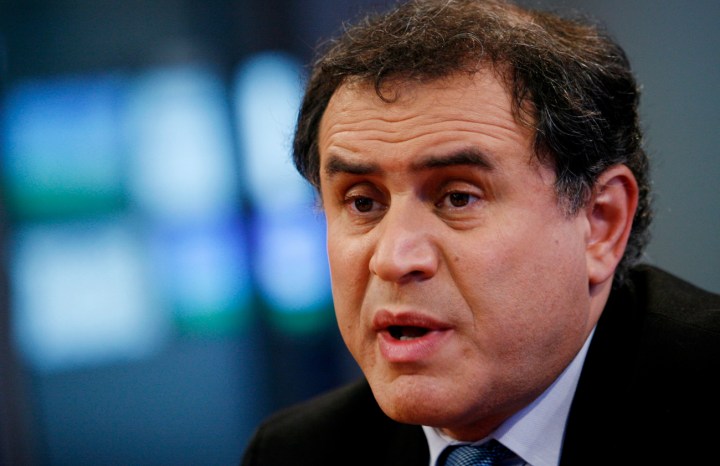The gospel of storm, according to Nouriel Roubini

Maybe Gustav Mahler’s self-description as “three times homeless: a Bohemian amongst Austrians, an Austrian amongst Germans, and a Jew throughout the world” gives a clue to the mind of Nouriel Roubini. And background to the man dubbed “Dr Doom” for his prediction of the near-collapse of the world financial system, is even more complicated. By J BROOKS SPECTOR.
Born in Istanbul of Iranian-Jewish parents, Roubini grew up in Italy, went to university there and then on to Harvard where his mentor was Jeffery Sachs. He is now one of the stars at the Stern School of Business at New York University and the head of his own influential consultancy, Roubini Global Economics. Perhaps the world-weariness of such a life’s journey could predict a predisposition towards sorrow and thus the apocalyptic warnings that have come from Roubini. Alternatively, though, maybe this journey has given Roubini a global perspective that transcends a narrower view.
Either way, one might imagine Dr Doom living in a gothic-like aerie – lit by candlelight – observing the foibles of humankind from afar, rather than his loft in New York City’s ultra-trendy Tribeca neighbourhood. This is where his other moniker, “The Playboy Economist,” seems to originate. New York Magazine quoted Roubini saying,“An economist is someone who knows 1,001 sexual positions, but doesn’t have a girlfriend.” But the magazine went on to observe “judging by the company kept throughout the night [at a charity event], we never saw him without a drink in hand, and at least two girls on his arm — this was false modesty.” This is also the same economist Foreign Policy put at number four on its list of the top 100 global thinkers.
Roubini himself acknowledged “The recession has been great for me.” And as for that eye candy, Roubini, said, “They love my beautiful mind. I am ugly, but they’re attracted to the brains. I’m a rock star among geeks, wonks, and nerds.”
A day before arriving in South Africa for the Discovery Invest Leadership Summit, where he joined Brazilian entrepreneur Ricardo Semler, South African banker Maria Ramos, behavioural economist Dan Ariely, Graça Machel, Wired editor Chris Anderson, local education innovator Taddy Blecher and Al Gore, Roubini had written on about the eurozone crisis for the Financial Times. He had called for decisive action to break the logjam: Greece should default and give up on the euro as its currency as the way out of its downward spiral, low competitiveness and its gathering economic depression. He wrote: “Exacerbated by a draconian fiscal austerity, its public debt is heading towards 200% of gross domestic product. To escape, Greece must now begin an orderly default, voluntarily exit the euro zone and return to the drachma.”
Roubini has been busy burnishing that Dr. Doom reputation. In his Johannesburg session, Roubini did offer one modest upbeat note. While there would be real pain if – or when – a second recession in the developed world occurs, emerging market nations like South Africa may be able to avoid a fully fledged slump themselves. But just in case anybody in the audience was beginning to feel slightly better, Roubini added. “These shocks are going to keep on occurring. Thinking the problems of the eurozone are going to go away is delusional…. The risk is actually that there is going be deceleration and the beginning of an economic contraction.”
Roubini noted that as the eurozone crisis has spread to French banks, as well as some of the other PIGS, such as Spain and Italy – these countries are thought to be too big to be allowed to fail – but they may also be too big to bail out. And if that was not bad enough, economic and financial policy makers in the US and eurozone countries are running out of tools to promote stimulus.
As if to underscore Roubini’s argument, the US Federal Reserve Bank that same day decided to use one of its last available tools – Operation Twist. In this, the Fed will be buying $400 billion of long-term Treasury Bonds and then sell short-term bonds in the same total amount. Selling these short-term bonds should cause the price of that debt to fall, and to drive up their interest rates.
Roubini did see some positives for the global economy. Firstly, there is the rise of the emerging market economies. In the next decade, a greater share of global growth will come from Asia, the Middle East, Central Europe and even Sub-Saharan Africa than from the mature economies. Concurrently, there will mean the rise of political heft of those same nations. The real governing body for international economics, now, is the G20, not the G7 because of this. Moreover, large corporations are sitting on lots of cash that can be invested to fuel future growth.
Despite the problems of the past several years, the universal trend of globalisation is something that has not been reversed. A challenge, now, is to ensure this ongoing drive is fair to all. Ultimately real economic progress will depend on increases in productivity. Having said that, while it is impossible to pick with certainty which industries are future winners, many industries do have real potential for upward growth and are not limited to those in the OECD nations.
On the other hand he argued that a double-dip recession was likely because the recovery from the previous one has been coming in the shape of a ‘U’, rather than the more usual ‘V’ shape. Moreover, because this was a financial recession rather than the more usual recession, fiscal stimuli alone are not much help. The debt overhang produces a slow recovery as deleveraging slowly works itself out. But the slowdown in spending now means a recovery becomes a hard, slow slog.
In the US, economic growth in the 1% range has been too slow to prevent a rise in unemployment. Many thought this was simply a bevy of black swan events – growth would go back up to 3%, but the current situation is like an airplane approaching stall speed – either you accelerate or you crash.
For the mature economies, the fundamental question is whether there will be acceleration or free fall and a nasty landing. From what he’s seen so far, Roubini’s bet is on an economic contraction as he argues that the austerity measures being imposed by governments actually have recessionary effects on output. If eurozone nations are forced to undertake fiscal austerity, other countries that can still provide short-term stimuli are going to have to step up.
Although monetary policy has a limited impact when there is excessive debt and insolvency rather than illiquidity, credit easing can be helpful and inflation should be the last thing central bankers worry about, given the dis-inflationary pressures. As a result, to restore credit growth, Roubini says public financing is going to have to strengthen eurozone banks and banking systems that are undercapitalised in a Europe-wide programme. Debt burdens like Greece’s that cannot be eased by growth, savings, or inflation will have to be dealt with through orderly debt restructuring, debt reduction and conversion of debt into equity.
But even if Greece and other peripheral eurozone countries get real debt relief, economic growth won’t resume until competitiveness is restored. And, without a rapid return to growth, more defaults cannot be avoided. The sole viable alternative is for Greece to depart from the eurozone. Only a return to a national currency, and a sharply depreciated one, will restore competitiveness and growth.
More broadly, the advanced economies’ high unemployment and anaemic growth evolve from structural reasons such as the rise of competitive emerging markets. Roubini explained the right response to this should not be protectionism, but the restoration of competitiveness and jobs with investments in high- quality education, job training and human-capital improvements, infrastructure and alternative energy instead.
Finally, Roubini argued that emerging-market economies actually have more policy tools left than the advanced economies. As a result, they can ease their monetary and fiscal policies. Countries like China that rely on net exports now need to come to the global party and accelerate reforms, like more rapid currency appreciation, and increased domestic demand. In his Business Day article, echoing his comments in Johannesburg, Roubini wrote: “The risks ahead are not just of a mild double-dip recession, but of a severe contraction that could turn into a second Great Depression. Wrong-headed policies during the first Great Depression led to trade and currency wars, disorderly debt defaults, deflation, rising income and wealth inequality, poverty, desperation, and social and political instability and eventually the rise of authoritarian regimes and the Second World War. The best way to avoid repeating such a sequence is bold and aggressive global policy action now.”
In his lecture, Roubini asked rhetorically, how do we turn this around now? Is it a mission impossible? Answering his own question, Roubini charged the current response has been to muddle through, but the world cannot keep kicking that tin can further down the road.
Eventually the question turns into: who bails out the IMF? Roubini insisted that we are not in a stable equilibrium – albeit an unpleasant one. Rather the situation now is that it is an unstable disequilibrium. There is a real likelihood of a slow-motion train wreck evolving out of Greece’s tragedy and spreading still further.
“There are no more rabbits, no more bullets. We need proper deleveraging and emerging markets can generate more growth, but things will be darker before they get any better.” With predictions like this, it is easy to understand why he keeps getting introduced to audiences as Dr Doom – as well as why he is in such demand as a speaker, analyst and writer in explaining where we are, how we got there and what we have to do now. DM
Read more:
- Nouriel Roubini Greece should default and abandon the euro in the Financial Times;
- The Twist in the Fed’s Stimulus Plan: Banks in Time;
- No Extra Credit in The New York Times.
Photo: REUTERS


















 Become an Insider
Become an Insider